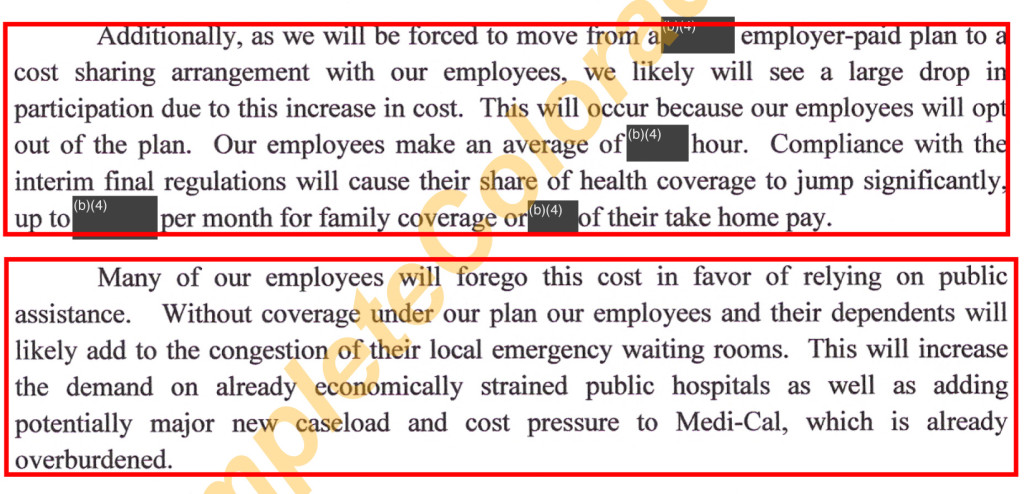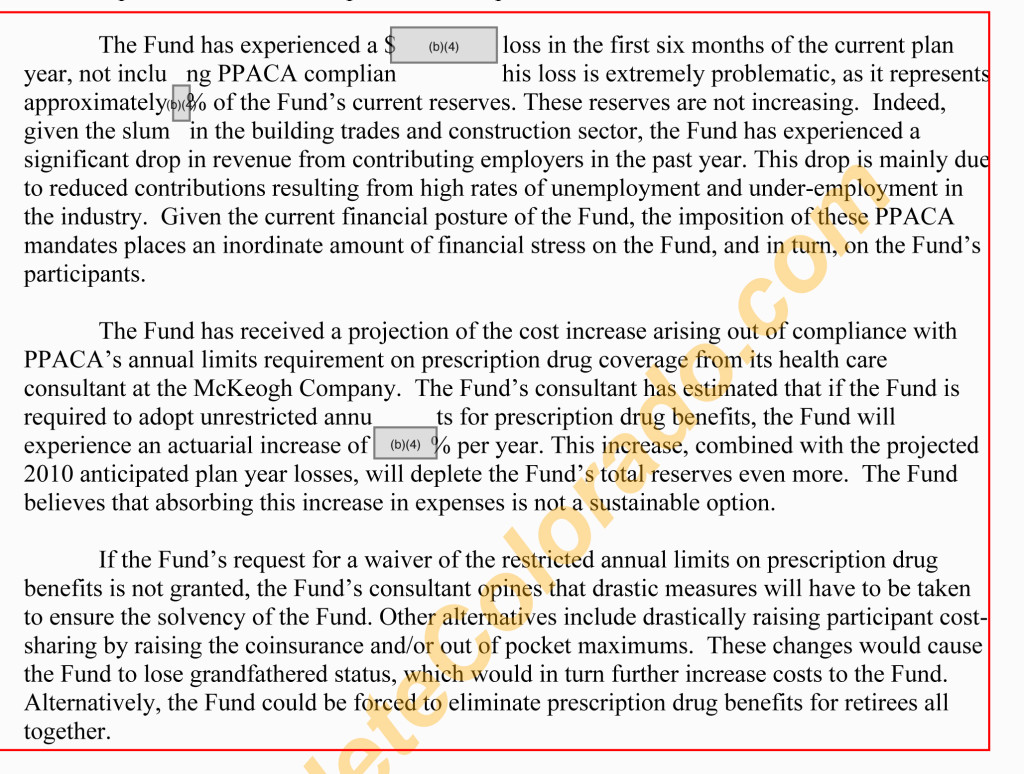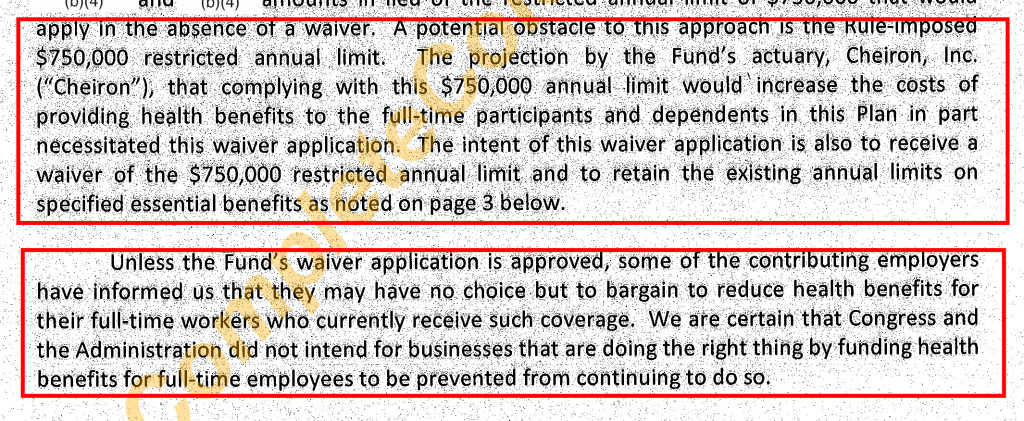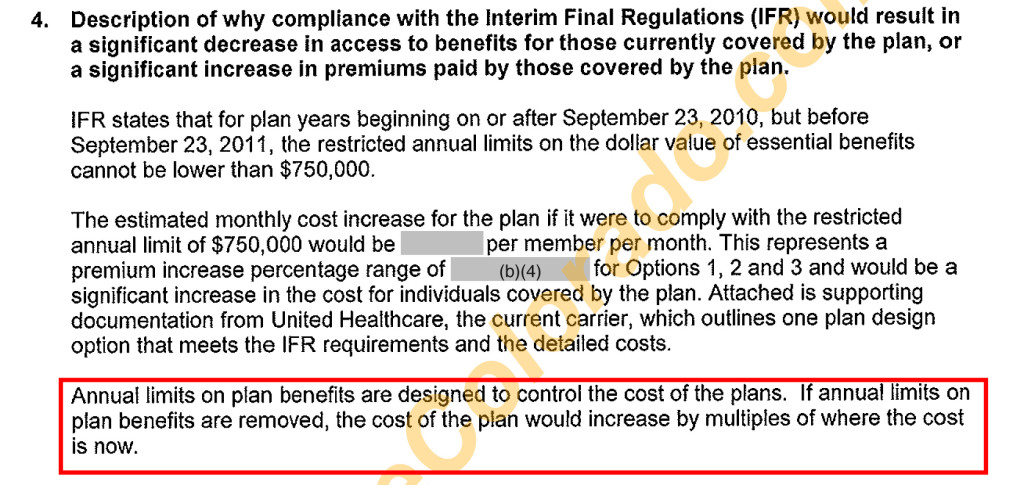Hundreds of ObamaCare waiver requests show that the law’s requirement to abolish annual limits on care was forcing carriers and employers to consider drastic options such as double-digit premium hikes, removing low-coverage plans from a menu of choices, reducing other benefits, or in some cases, folding the plan altogether. An annual limit on a health care plan, for example, is when an insurer has a provision that places a total dollar limit on the amount of claims the insurer is responsible for on any single individual within a year.
Many waiver requests were for multi-employer plans, known as Taft-Hartley plans, used by unions. Some labor heavyweights who helped get the controversial bill passed made national news this past summer when they vocally complained about the increasing difficulty dealing with the “unintended consequences” of ObamaCare. The waiver requests show many unions scrambling to stay in compliance with the “annual limits” provision just weeks after the law was passed.
For actuaries and plan administrators, annual limits are not considered a mechanism to simply increase profits as some would imply, but rather are important cost controls, allowing the plan to offer a wider range of benefits to all participants, knowing that one or two catastrophic illnesses cannot bankrupt the fund.
For example, the annual limit waiver from the United Federation of Teachers Welfare Fund states in its prescription drug plan request:
“The Fund could not remain solvent if it were required to raise its annual limits on prescription drugs…” (emphasis added).
The Carpenters H&W Philadelphia waiver request was typical of the scores of union waivers we reviewed. Their request bleakly states if the waiver is not granted, then “…[o]ther alternatives include drastically raising participant cost-sharing by raising the coinsurance and/or out of pocket maximums.” The same waiver request goes on to predict, “Alternatively, the Fund could be forced to eliminate prescription drug benefits for retirees all together.”
While all of the waivers provided contained redacted financial information, the Indiana Teamsters waiver was left accidentally unredacted. The numbers are telling.
The Indiana Teamsters estimated that the PPACA requirements for 2011 and beyond would raise coverage costs by 15.6 percent. Application of ObamaCare’s annual limit rules would increase aggregate costs by 7 percent.
Retirees in the plan were hardest hit. Combined with other rules that allowed some coverage for spouses, the ObamaCare rules multiplied the Indiana Teamsters plan’s exposure by 8, thereby increasing the cost of coverage by an estimated 68 percent.
Ultimately, Health and Human Services granted roughly 1,200 such waiver requests. Virtually all of the waiver requests referenced in this report were from 2010, and were obtained from the Department of Health and Human Services under the Freedom of Information Act.
Other waiver requests predicted that the increased premiums needed to cover the increased exposure from no annual limits would naturally force many participants to drop coverage and rely on “public assistance.”
The waiver application (a portion of which is pictured below) by Darensbarries, a California agriculture company, says:
Many of our employees will forego this cost in favor of relying on public assistance. Without coverage under our plan our employees and their dependents will likely add to the congestion of their local emergency waiting rooms. This will increase the demand on already economically strained public hospitals as well as adding potentially major new caseload and cost pressure to Medi-Cal, which is already overburdened.

CoverTN demonstrates that not even government-run programs are insulated from basic economic realities.
While it may be fashionable amongst ObamaCare supporters to demonize annual limits as a profit-making mechanism for private insurance companies, the waiver request from CoverTN is instructive because CoverTN is a government-run program offered by the State of Tennessee. Their waiver estimated “monthly premiums would increase 86%,” and concluded, “..this level of increase would result in thousands of current members dropping coverage.” How many thousands might drop coverage? CoverTN estimated “20,000 individuals.”

To review the roughly 200 waiver requests we obtained, please visit CompleteColorado.com’s ScribD page.
*End of Report*
Send us tips at CompleteColorado@gmail.com.
Other clips from various waiver requests are embedded below.
A clip from the aforementioned Carpenters H&W Philadelphia:
A clip from the IBEW Local 126 union:
A clip from the Adecco Group:
Finally, a look at the full, accidentally unredacted waiver request from the Indiana Teamsters:
Pages From Indiana Teamsters – UNRedacted HWM by CompleteColorado





